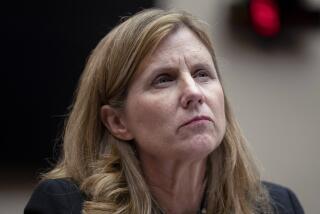Divorced, out of job at Christian school
CHICAGO — At another college, professor Kent Gramm’s divorce from his wife of 30 years might be a private matter known only to friends and close colleagues.
But at Wheaton College in Illinois, the end of the popular English professor’s marriage has cost him his job -- and sparked a debate about whether a divorce should disqualify a faculty member from teaching there.
Although the college has sometimes hired or retained staff employees whose marriages have ended, officials say those employees must talk with a staff member to determine whether the divorce meets biblical standards. Gramm told administrators about his divorce but refused to discuss the details.
“I think it’s wrong to have to discuss your personal life with your employer,” he said, “and I also don’t want to be in a position of accusing my spouse, so I declined to appeal or discuss the matter in any way with my employer.”
Officials say they were willing to allow Gramm, who has been at the school for 20 years, to remain at the college for another year as he sought work, but he declined.
The issue has become the talk of the campus, covered in the newspaper, circulated in a pro-Gramm petition and debated on a Facebook site. The matter has gained attention in part because Gramm is a popular professor, said Ruth Moon, editor in chief of the Wheaton Record.
“It’s a big deal on campus,” said Moon, who has taken a creative nonfiction class with Gramm.
The issue emerged after the professor notified administrators that he and his wife, Lynelle, had filed for divorce last month.
Many theological conservatives say the New Testament permits divorce only in cases of adultery or desertion. Wheaton requires faculty and staff to sign a faith statement and adhere to standards of conduct in areas including marriage, Provost Stan Jones said.
Still, every year, the college has dealt with several cases in which it must evaluate the divorce of a job applicant or a staff or faculty member and consider whether it matches the exceptions laid out in Matthew 19 and the writings of the Apostle Paul.
“And if it does, we stand by the applicant,” Jones said. “In cases where it doesn’t, it’s a tragic instance where we have to say, because of the nature of the institution, we can’t employ you.”
Gramm says he understands the policy and recognizes that the college is within its rights to set its standards. Yet, he says, students are facing the same marital statistics as other Americans, and many will themselves someday divorce.
“And I feel that it’s important for them to know that they’re not somehow rejected by God for having more or less normal lives and for having lives that didn’t work out the way they intended them to turn out,” Gramm said.
Tim George, student body president, said it was a shame that Gramm had to leave, because he was an outstanding teaching professor and a scholar.
Although there has been controversy, the majority of students support the college’s decision, he said.
The college has lost faculty in the past for issues relating to its faith statement.
Religious colleges of all stripes have taken varying views of the role of faith among their staff, Jones said. Some regard their spiritual origins as a historic relic, while others have sought to maintain a critical mass of believers. A third approach, like Wheaton’s, asks all faculty to embrace a shared set of beliefs, he said.
Gramm said college officials had been individually cordial and compassionate, and he was sorry about how things turned out.
“I would like to see a broader understanding of faithfulness and mercy, and a broader understanding of human weakness and how that plays out in life,” he said.
More to Read
Sign up for Essential California
The most important California stories and recommendations in your inbox every morning.
You may occasionally receive promotional content from the Los Angeles Times.










